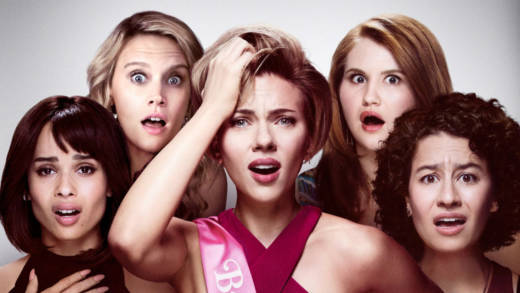Intersectional feminism has been working very hard the last few years to alter how sex workers are viewed by those who don't work in the industry. It has been remarkably effective in humanizing one of the most historically judged and marginalized groups in the world. Social media has also assisted those working in the sex industry in offering a realistic day-to-day view of what the work actually entails (Jacq the Stripper has been particularly effective at this). These developments have undoubtedly shifted the perception of the general public, especially with younger demographics. In this super-woke cultural environment, changing the usual gender of the dead sex worker just might not be enough to get a lot of women on board.
Had Rough Night come out 19 years ago, on the heels of 1998's truly hard-to-watch Very Bad Things (in which a prostitute is accidentally killed at a bachelor party), it might have made a modicum of sense as an antidote to, and revenge for, that unbearably masculine movie. Of course, it's highly unlikely that Rough Night could have even gotten a green light back then, but waiting two decades to flip this particular death-of-a-sex-worker script makes the joke too old for much of its millennial target audience to even get get the reference. (Very Bad Things is certainly very far down the list of 1990s Cameron Diaz vehicles we look back on fondly.)
It is possible too that, even without the reach and influence of intersectional feminism, we are simply tired, as a culture, of watching sex workers only represented as caricatures (The Best Little Whorehouse in Texas), by stereotypes -- being either hardened, drug-dependent or dead -- or by tropes, the most common being the hooker with a heart of gold. See: Pretty Woman, Trading Places, Risky Business, Leaving Las Vegas, True Romance -- a film that features a call girl who specifies that she's only ever had two clients, as a means for audiences to like her more -- and too many others to mention. For too long now, a tragic undercurrent has followed almost all on-screen representations of sex workers too.
Recent years have seen a moderate shift, as indicated by 2012's joyful, and extremely popular Magic Mike, (though even that movie ended with Channing Tatum's titular character leaving behind the world of stripping) and For a Good Time, Call..., which went out of its way to represent sex workers as Just Like You And Me. More recently, Hulu's Harlots series has been praised across the board as both feminist and sex worker-positive:
In the end, Rough Night's disappointing weekend might push media and movies forward, and allow those who work in the sex industry a place in popular culture that doesn't involve either dehumanization or the need to be saved. After decades of reductive stereotyping, it is most definitely time for a change. Rough Night just found that out the hard way.


